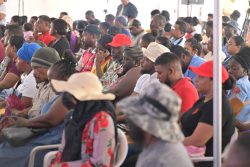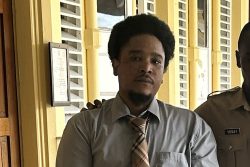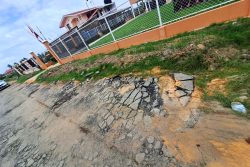The Iwokrama International Centre for Rainforest Conservation and Development and Rupununi communities on Tuesday rescued and relocated 27 arapaima (2 adults and 25 juveniles) trapped in a drying pond in Kurupukari, Essequibo River.
According to an Iwokrama report, information was forwarded to its office of an eight-foot arapaima trapped in a drying pond near Kurupukari landing. Having received the report, a verification was carried out by a monitoring team on November 3.
Led by Iwokrama’s Head Ranger, Micah Davis, the monitoring team made a three hour up-stream trip from the Kurupukari team where one adult arapaima and four juveniles were located. After a complete assessment was made, it was determined that the fish would not have survived if they remained in that location, as the pond was drying out and would continue to do so in the current dry season.
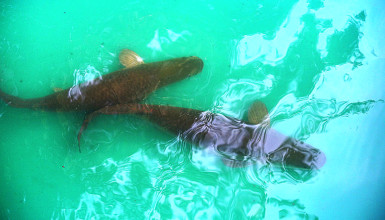
Logistically, the report said that the Iwokrama staffers were not able to rescue the fish without assistance and as a result, a collaborative effort amongst the Fair View villagers, the North Rupununi District Develop-ment Board (NRDDB), local fish experts, Scientist Dr Leslie DeSouza, Stephanu Honorio of Rewa Village and the Fisheries Department was organised.
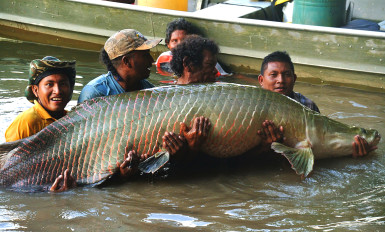
In addition to the plan being vetted to ensure the activities were within the NRDDB Arapaima Management Plan, further consultations were had with NRDDB Executives: Anthony Andries, Randy Gilbert, Rodney Davis and Lakeram Haynes; Iwok-rama Head Ranger, Micah Davis; Iwokrama Outreach Manager, Samantha James; and Fair View Toshao, Lucy Marslowe. Collec-tively, it was agreed, if any fish should not survive the rescue, they would be slaughtered and distributed amongst the residents of Fair View village.
Prior to the commencement of the rescue mission, an updated report was received quantifying the endangered fish to two adults and an unnumbered quantity of juveniles.
On November 10, the report said that the rescue operation commenced. With the water levels being extremely low, at this time of the year, the dry season, boats were taken up the falls a day prior. The team departed Fair View landing at 8.00am for an expected arrival time of 11.30am, at the pond, which is located in an oxbow of the Essequibo River, within the Fair View Village boundary.
The rescue team of 13 adult members, arrived at the pond which was approximately 150m in diameter and located approximately 200m from the river’s edge. According to the report, half the pond was dry, it consisted of arapipi palms, moco moco in a mixed forest surrounding with edges covered in dried leaves, and had at its centre a hole approximately 120cm deep.
It was estimated, the pond would have dried out, if the hot weather continued. The thirteen-person team entered the pond, corralled the adult fish, the first of which was 2.3m in length and the second 2.6m, with a large net and directed them into a submerged canoe. The canoe being half filled with water was dragged to the river for approximately five to seven minutes. During the process the fish were kept in an upright position, observed to be breathing and their wetness was maintained, the report added.
During the move, Honorio, a trained specialist in arapaima relocation, held the adult fish’s heads ensuring breathing was maintained, while Everton Allicock, Kevin Edwards and Micah Davis held the bodies.
After they each took four breaths, upon entering the river, they were allowed to swim away and were observed until they came up to breathe after the release.
It was observed, both fish had evidence of injuries resulting from sport fishing. Marks were evident their backs where scales were missing and flesh had subsequently healed over the areas.
Traditionally, the pond was never a fishing ground, the Fair View captains said, it was not fished until recently, when sport fishers commenced using it, and in addition to which, the pond is not monitored through the Arapaima Management Plan.
Upon the successful release of the adults, the team returned to the pond to commence the release of the 25 juveniles which ranged in length between approximately 16 to 20 inches, the report said.
The juveniles were caught with a cast net and seine, caution being observed with the nets to ensure the fish were able to breathe while simultaneously not stressed. After which, they were removed rapidly, and placed into plastic tubs cut from drums accommodating a maximum of six each, covered with leaves to deter the fish from escaping.
As the team approached the river, the tub was submerged allowing fresh water to enter and simultaneously each fish was monitored for breathing and were allowed to take three breaths prior to release into the river.
After release, they were observed swimming along the river bank under the shade of the trees.
The rescue team comprised: Micah Davis, Iwokrama, Head Ranger; Kevin Edwards, Iwokrama, Tourism Coor-dinator; Lakeram Haynes, Kwatamang Sr Council and NRDDB Treasurer; Stephanu Honorio, Rewa Village Council; Dennis Edwards, Iwokrama boat captain/Fair View; Bernard Williams, Iwokrama boat captain, Fair View; Rojas Jonas, Fair View; Dora Jonas, Fair View; Lucy Marslowe, Toshao Fair View; Everton Allicock, Fair View; Ivor Ignacio, Fair View; Samantha James, Iwokrama, Outreach Manager, Kwatamang Village; Rockland Leo, Fair View; Deon Berbnard, Fair View; Carmella Williams, Kwatamang, Kaiwino Haynes, Kwatamang; and Tai Haynes, Kwatamang.
In April 2014, it was reported that the Arapaima population in the north Rupununi dropped by 31%, according to preliminary results of a survey. There was a concern then that sport fishing had led to the decline of the endangered species.
“We just did a survey and it’s just under 5,000,” Chief Executive Officer of the North Rupununi District Development Board (NRDDB) Ivor Marslow told a stakeholders’ meeting on the organisation’s Community Monitoring, Reporting & Verification (CMRV) project. The 16 communities of the north Rupununi have been implementing the first CMRV project in Guyana.
The NRDDB had been conducting a survey on the fish and according to information, from a count of 5,853 in 2011, the Arapaima stock had dropped to 4,022 in 2014.
The enormous Arapaima (Arapaima gigas) is a highly endangered and poorly understood species that has been subject to extreme overfishing in neighbouring countries. Since the 1960s, concerns have been expressed about the fate of the fish, and the need for it to be protected. During that time, it was disclosed that the Arapaima, which inhabits the Rupununi River, was being ruthlessly harvested and sold across the border in Brazil.



